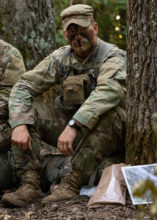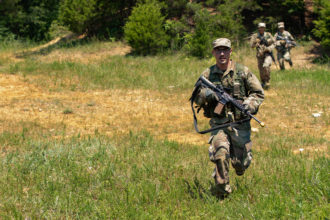
After completing the first 72 hours of their Field Training Exercise (FTX) and receiving a well-deserved refit day, Cadets from 9th Regiment, Advanced Camp, begin the next phase of their training by moving to a new area.
Unlike the initial phase, Cadets must now plan and execute their missions with little to no assistance from the Cadre staff, and face new challenging simulations designed to create high levels of pressure and anxiety within the platoons to add to the realism of the training.
“You got to learn how to manage, to be under stress and make good decisions or at least be able to make a decision,” said Rafael Duyck, a Cadet from Oregon State University. “The worst thing you can do out there is freeze.”
While all Cadets arrive to Cadet Summer Training (CST) with the theoretical knowledge to perform the missions, FTX is the first time for many individuals to put classroom knowledge into practice.
The high speed of the action, loud noises, lack of sleep, hunger and Cadre-added challenges made Cadets anxious regardless of their experience level.
“My hand was shaking at one point,” said Duyck. “It could have been me being nervous because I was under a lot of stress and under pressure… I also had a lot of adrenaline going through me and I was just like ‘yeah man, we need to get this done.’”
According to 2nd Lt. Ryan Humphry, a member from the Cadre, every detail of the training is designed to exploit the leadership potential of each individual Cadet and prepare them to lead Soldiers on the battlefield in a professional and efficient way. But before they can do that, they need to understand their limits and how they react to stress.
“When the sleep starts to go and people start to get hungry a lot of true colors will start to show up,” Humphry said.
To combat these stressors, Cadets keep themselves motivated and sharp by leaning on each other. “You can kind of tell when people’s mood shift,” said Duyck. “I always ask people ‘hey, how are you doing’ if I notice they are acting funny—just to make sure they are OK. I know environments like this take a toll on you.”
This comradery and attention to each other’s well-being is a lesson that cannot be found in any manual or learned in any classroom, but one that every Cadet cheerfully discovers after they spend countless hours next to each other training, keeping themselves awake, eating MREs and sleeping under the stars on the field.

“This is a team effort. We are a platoon of 39… is not 39 individuals: is a big family,” said Duyck.




